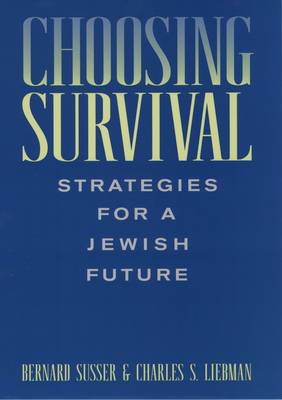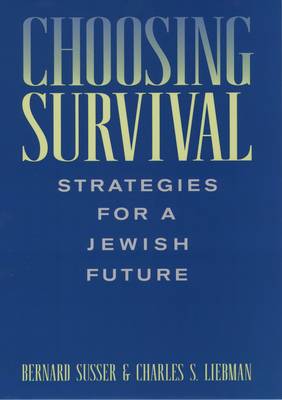
Bedankt voor het vertrouwen het afgelopen jaar! Om jou te bedanken bieden we GRATIS verzending (in België) aan op alles gedurende de hele maand januari.
- Afhalen na 1 uur in een winkel met voorraad
- In januari gratis thuislevering in België
- Ruim aanbod met 7 miljoen producten
Bedankt voor het vertrouwen het afgelopen jaar! Om jou te bedanken bieden we GRATIS verzending (in België) aan op alles gedurende de hele maand januari.
- Afhalen na 1 uur in een winkel met voorraad
- In januari gratis thuislevering in België
- Ruim aanbod met 7 miljoen producten
Zoeken
Choosing Survival
Strategies for a Jewish Future
Bernard Susser, Charles S Liebman
Hardcover | Engels
€ 83,95
+ 167 punten
Omschrijving
Throughout history, the persecutions of the Jewish people have been central to their identity and to the cohesion of their religion and cultural heritage. But now, with the success of the Jewish State of Israel and the prosperity of Jews in the United States, the collective sufferings that have forged the Jewish identity are disappearing. The compelling question Bernard Susser and Charles Liebman ask in Choosing Survival is: Will this success paradoxically prove fatal to Judaism?
Susser and Liebman paint a disturbing portrait of the decline of Judaism in both Israel and the United States and the various--and mainly ineffective--efforts to reverse that decline. In Israel, as Jews are increasingly drawn to cosmopolitan Western culture, Jewishness is in danger of being reduced merely to communal folkways, while political tensions between religious and secular Jews threaten to pull the state apart. In the U.S., assimilation and secularization is even harder to resist. Efforts to strengthen Jewish identity by claiming the U.S. is still anti-Semitic and by pointing to the Holocaust and the threats to Israel's survival have not worked. The authors do, however, see a hopeful sign in Jewish Orthodoxy which, while not a viable solution to the problem, is successfully passing on its tenets and practices and attracting many non-Orthodox Jews. They identify several aspects of Orthodoxy that can be emulated by all Jews and hold the best hope for Jewish survival--its reverence for study, its ability to set and maintain boundaries, and its deep belief in community.
For anyone concerned about the fate of Judaism and what it means to be Jewish, Choosing Survival is an impassioned, troubling, and essential book.
Susser and Liebman paint a disturbing portrait of the decline of Judaism in both Israel and the United States and the various--and mainly ineffective--efforts to reverse that decline. In Israel, as Jews are increasingly drawn to cosmopolitan Western culture, Jewishness is in danger of being reduced merely to communal folkways, while political tensions between religious and secular Jews threaten to pull the state apart. In the U.S., assimilation and secularization is even harder to resist. Efforts to strengthen Jewish identity by claiming the U.S. is still anti-Semitic and by pointing to the Holocaust and the threats to Israel's survival have not worked. The authors do, however, see a hopeful sign in Jewish Orthodoxy which, while not a viable solution to the problem, is successfully passing on its tenets and practices and attracting many non-Orthodox Jews. They identify several aspects of Orthodoxy that can be emulated by all Jews and hold the best hope for Jewish survival--its reverence for study, its ability to set and maintain boundaries, and its deep belief in community.
For anyone concerned about the fate of Judaism and what it means to be Jewish, Choosing Survival is an impassioned, troubling, and essential book.
Specificaties
Betrokkenen
- Auteur(s):
- Uitgeverij:
Inhoud
- Aantal bladzijden:
- 224
- Taal:
- Engels
Eigenschappen
- Productcode (EAN):
- 9780195127454
- Verschijningsdatum:
- 24/06/1999
- Uitvoering:
- Hardcover
- Formaat:
- Genaaid
- Afmetingen:
- 163 mm x 243 mm
- Gewicht:
- 512 g

Alleen bij Standaard Boekhandel
+ 167 punten op je klantenkaart van Standaard Boekhandel
Beoordelingen
We publiceren alleen reviews die voldoen aan de voorwaarden voor reviews. Bekijk onze voorwaarden voor reviews.









